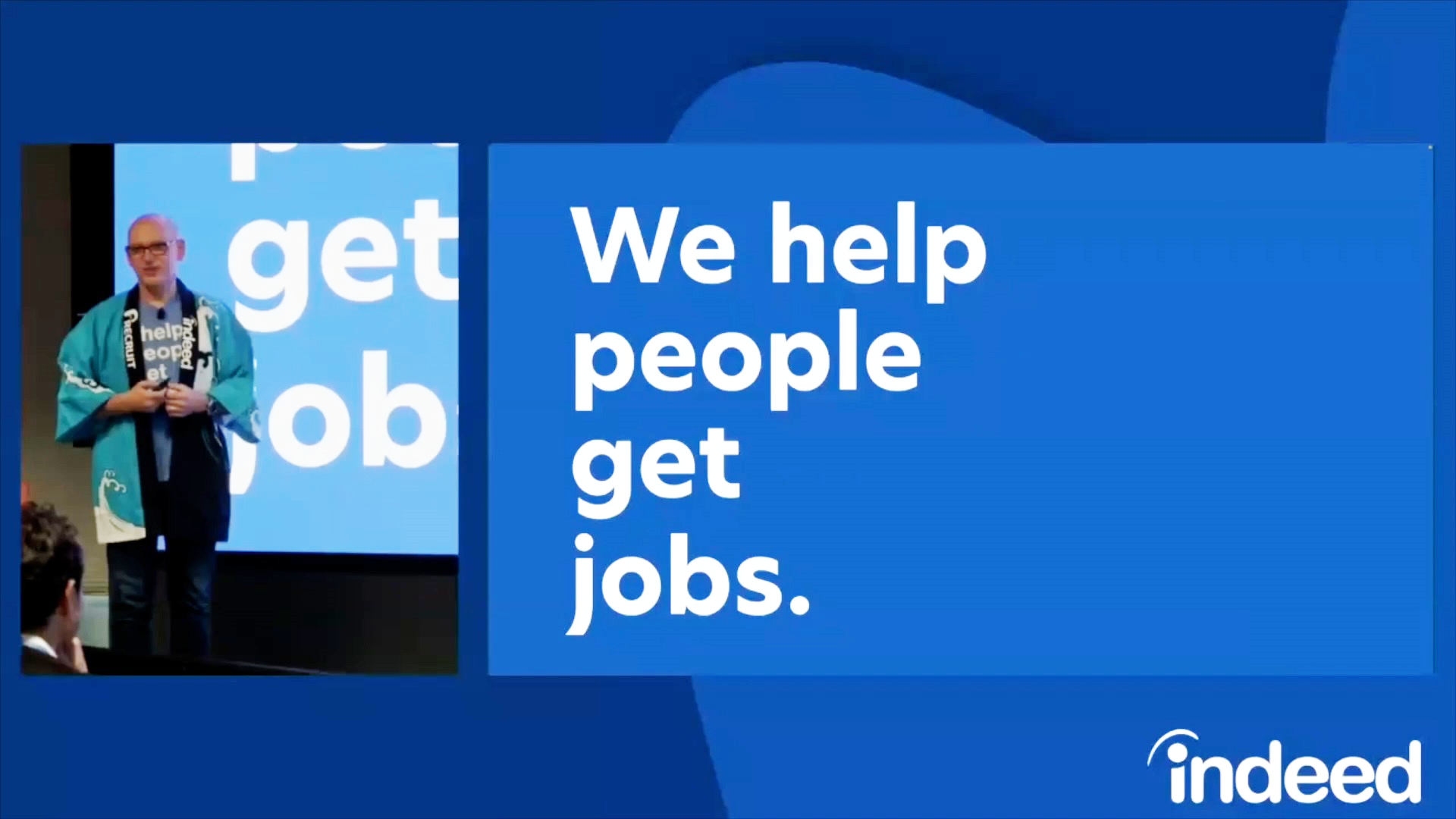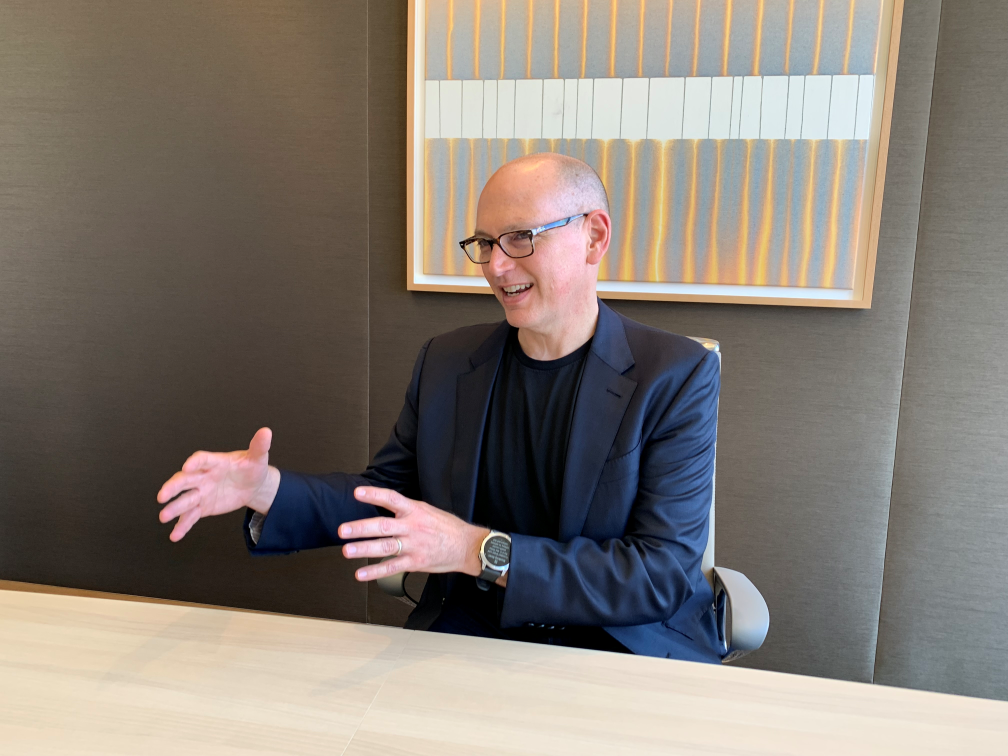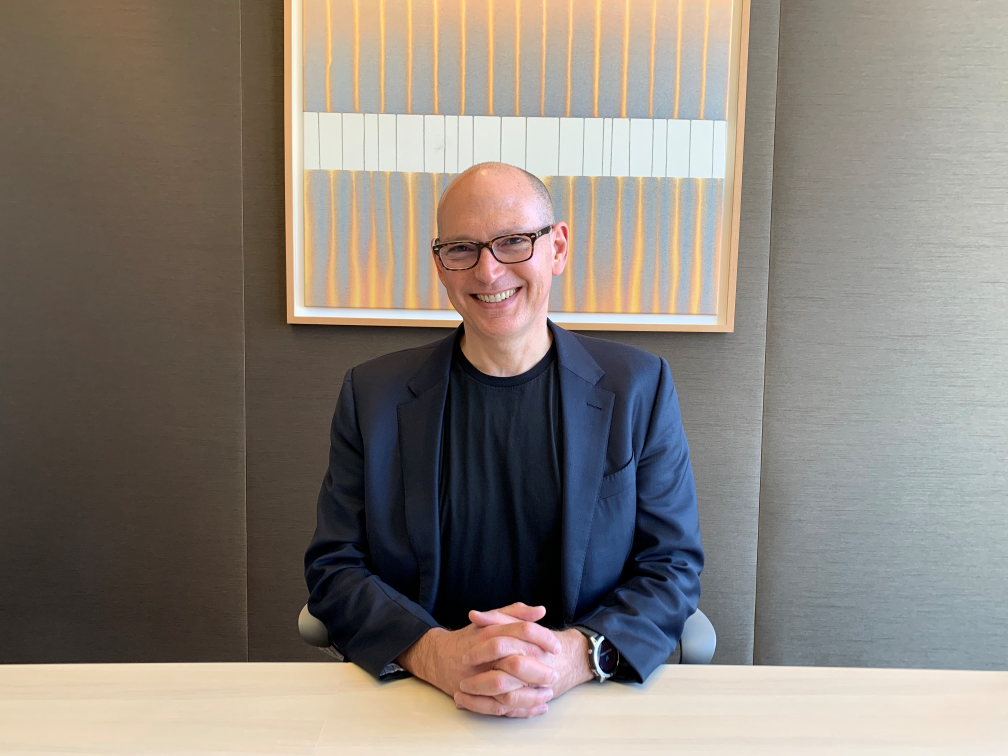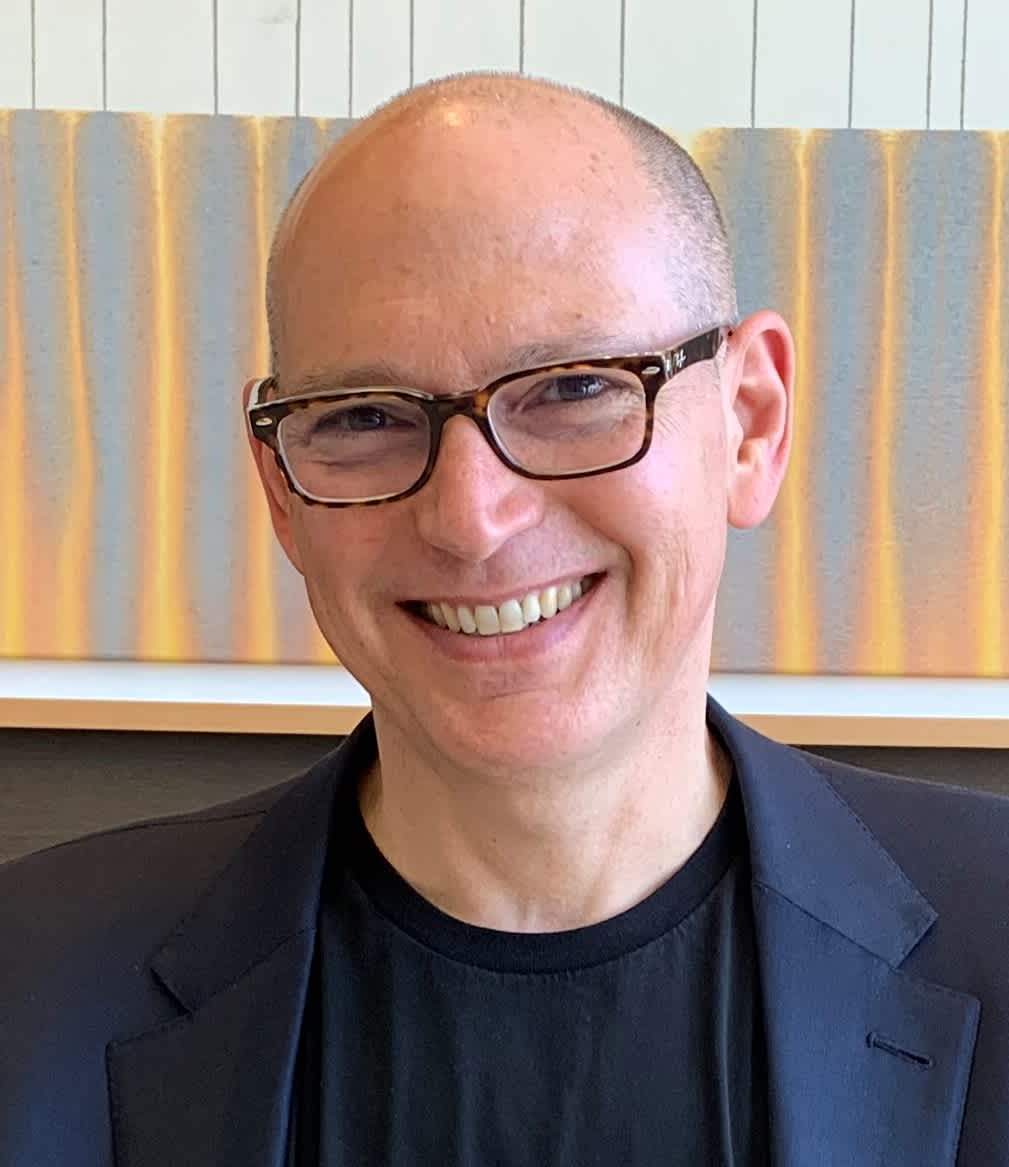Indeed Japan was established in 2013 to advance Indeed's core mission: “We help people get jobs.” To mark the company’s 10th anniversary in 2023, Indeed CEO Chris Hyams visited Tokyo to spend time with the Japan-based team. While in the country, he reinforced the company’s mission, vision, and values to employees and shared insight into Indeed’s aims over the next decade.
Indeed’s Clear Mission and Shared Vision
In November 2023, Indeed CEO Chris Hyams joined the company’s global town hall meeting in Tokyo to commemorate Indeed Japan’s anniversary. He started the meeting as he always does, by emphasizing Indeed’s core mission, “We help people get jobs.” He stated, “This mission is what gets us out of bed in the morning and keeps us going all day. It’s so much more than just a slogan on a T-shirt. This is our connection, every single day, to the people whose lives we touch with our work.”
He went on to mention Indeed’s vision “to make the hiring experience as easy as pushing a button” to emphasize that the company’s 12,000 employees around the planet work together to make that vision a reality.

Chris Hyams speaking about Indeed’s mission at the November town hall meeting in Tokyo
Chris also spoke with the team about the three key success factors for Indeed over the next decade: Accelerating the company’s evolution into a comprehensive matching and hiring marketplace, achieving its social impact goals, and using AI responsibly.
Accelerating Indeed’s Evolution into a Comprehensive Matching and Hiring Marketplace
As Indeed continues to grow and evolve, the company is focused on becoming a comprehensive matching and hiring marketplace that covers the whole hiring process. Indeed wants recruiters to be able to complete every step on its platform — from job posting and application tracking to interviews and job offers — and to make it as easy for job seekers to get a job as pushing a button. The one-stop marketplace is essential to achieving all this.
“Of the estimated US$327 billion global job matching market, the advertising and branding business on job boards represents less than US$30 billion*1,” Chris noted. “The market for the process closer to hiring — a largely untapped area — is 10 times that latter figure, so there’s a vast opportunity opening up.”

Working Alongside Other Recruit Group Members to Achieve Social Impact Goals
Along with business growth, Indeed is dedicated to making a positive difference in society. Chris said: “Indeed is now a platform in more than 60 countries in 28 languages. 3.5 million employers use Indeed each year to find and hire new employees*2, and more than 350 million unique visitors use Indeed every month to search for jobs, post resumes, research companies, and more*3. We believe it’s vital to use this influence to change society for the better, and we’ve set long-term sustainability (environmental, social and governance) goals with Recruit Holdings in 2021. In the area of social impact, for example, we set two mutual goals and are striving to achieve them by FY2030.”
The first of those social impact goals is to reduce the time it takes to get hired by half by FY2030 as compared to FY2021. For many people, work is the foundation of their daily lives, and recent OECD data shows that nearly 40% of people in OECD households around the world would fall into poverty if they had no income for three months or more*4. “Indeed aims to achieve this through its products,” said Chris.
The second goal is to help 30 million people facing barriers in the labor market around the world get hired by FY2030 ― barriers such as education level, criminal records, disabilities, military experience and others.
“It's about helping job seekers who are facing problems that cannot be solved by simply cutting the time to get hired in half,” Chris explained. Of the 168 million people in the U.S. labor force, for example, it is estimated that 42 million have disabilities, 70 million do not have a four-year college degree, and 77 million have criminal records*5, meaning the majority face barriers in the labor market. “Indeed is dedicated to addressing this goal through our product as well as partnerships, and has already helped 3.9 million people facing barriers find employment since the goal launched in FY2021*6,” Chris added.

Responsible AI Use Will Determine How Well Indeed Does at Building a Better Future of Work Together with Society over the Next Decade
One factor is essential to achieving Indeed’s vision and social impact goals ― the use of AI. “There is no doubt that AI will be a key factor in the next decade of Indeed’s history,” Chris stressed. “I also believe that the vast amount of data that we possess will give us a significant competitive advantage in terms of both quality and quantity.”
However, Chris admitted that there are concerns about AI. One is the possibility that AI, which is based on human-generated data, can reflect or even amplify human thinking patterns.
“Hiring in particular is an area where this influence is significant, so that remains a concern unless necessary steps are taken,” he said. If AI creates disruptive innovations that shake up existing businesses, some individuals will lose their ability to make a living, he indicates, adding “the impact on these jobs is one of my biggest concerns.”
Still, Chris believes the way forward is bright, and states: “In the long run, technology will almost certainly make the way we work and live better and more human. In fact, AI has already dramatically improved the matching of job seekers and jobs on Indeed. We’re also aspiring to implement Responsible AI, which we believe will ultimately reduce inequalities in hiring.”
As an example, Chris introduced Indeed’s AI job recommendation feature, which delivers a personalized feed of the best matches to each job seeker. Job seekers are 55% more likely to respond to an AI recommendation than one they see in search results. Chris also introduced Indeed’s generative AI-based job description tool that allows companies to create job descriptions just by inputting some key details. This tool is already available, speeding up a process that used to take hours to just minutes. AI tools for recruiters that will promote skill-based hiring are also under development, which will help them find candidates with the skills needed to do the job, regardless of factors such as educational background.
Chris concluded: “Indeed aims to make hiring easier, faster and more human, all while leveraging AI responsibly. We’re not trying to create robots to replace humans, nor are we trying to leave the decision to pass or fail a job up to a robot. We want to use AI to eliminate inequality in hiring and make it easier for job seekers to find a job that fits them, and to work with a sense of personal wellbeing. We also want to help recruiters become more efficient so that they can focus on more rewarding work. We believe that hiring should be human-oriented, and we can achieve this through the combined power of humans and AI. We’re striving to evolve with you, keeping humanity at the center of the hiring process. We know there is room for improvement in the world of hiring. We look forward to working with society to build a better future for work.”
*1 Sum of the estimated size of addressable markets for the job advertising and talent sourcing tools market, the direct hire market, and the retained search market in terms of annual revenue; the estimated size of the addressable market for the internal recruitment automation market in terms of the amount of current expenses of employers for internal talent acquisition resources that could be reasonably automated and monetized; and the addressable markets for the temporary staffing market in terms of annual gross profit. In each case, these are based on the Company’s estimates and third-party market data.
*2 Indeed data, worldwide
*3 Indeed data, an average of each month’s total of distinct cookie IDs visiting Indeed’s site between April 2023 and September 2023.
*4 The figure is based on data compiled in 28 countries (source: OECD (2020), How's Life? 2020: Measuring Well-Being).
*5 Indeed calculated this based on data from Pew Research Center, Opportunity@Work, and the National Conference of State Legislatures.
*6 Represents the number of hires made through Indeed as reported from both job seeker and employer sources through our Hired Signal measurement, from May 1, 2021 to March 31, 2023 globally for job seekers who faced at least one of the following barriers: education level, criminal record, military experience, disability or lack of essentials such as a computer or Internet access.

Chris Hyams
Indeed CEO
Chris joined Indeed in 2010 as vice president of product. In 2015, he was appointed president — where he was responsible for improving Indeed’s profitability and the client success area — before being appointed CEO in April 2019. He drives the organization daily to stay mindful of Indeed’s core mission: “We help people get jobs.” Inspired by his filmmaker father, Chris is a sponsor of Rising Voices, a gateway to success for young underrepresented filmmakers. He’s also a board member of DivInc, a technology accelerator whose mission is to create social and economic equity through entrepreneurship, and a board member of Huston-Tillotson University, Austin’s oldest institution of higher education.